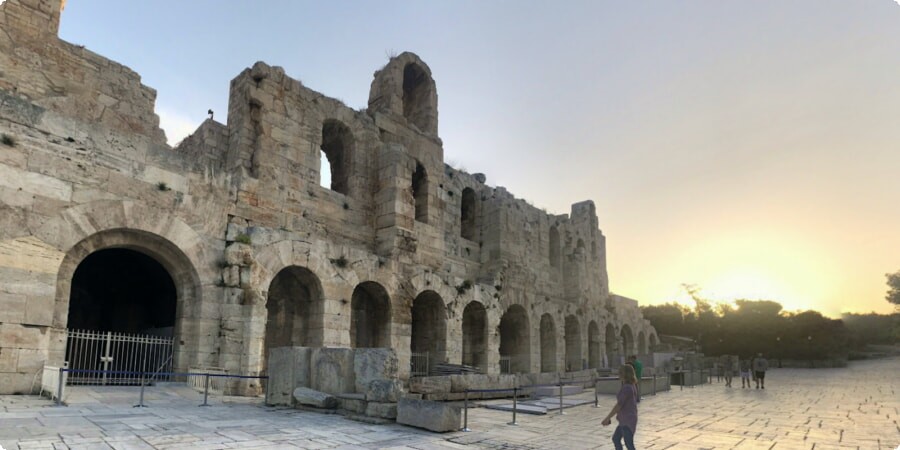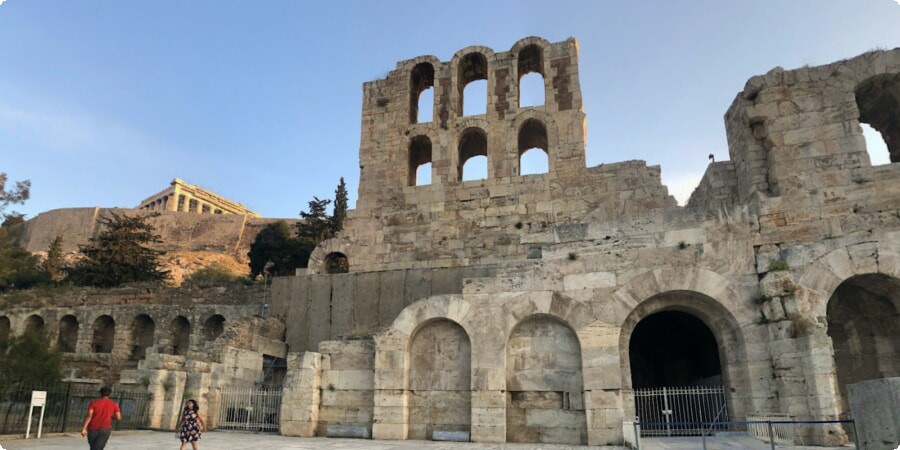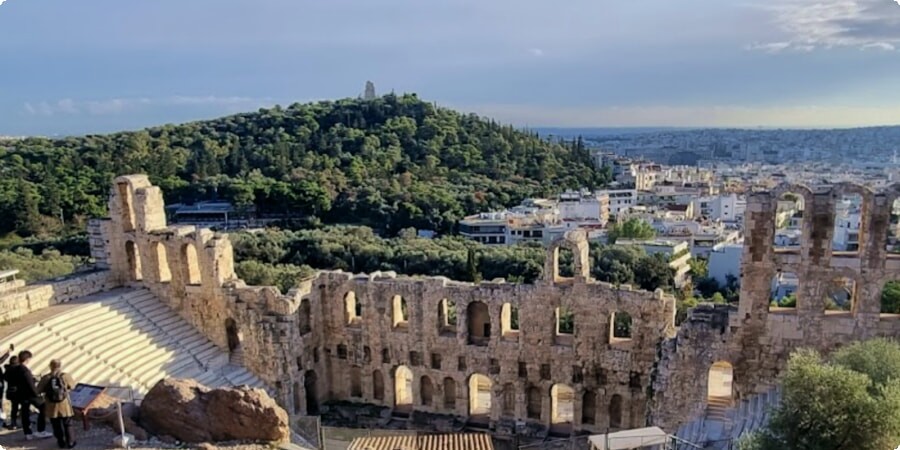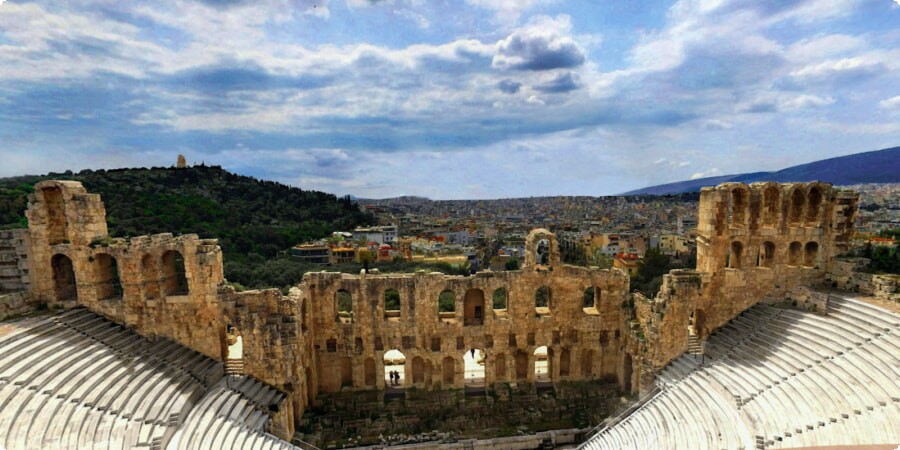Odeon of Herodes Atticus: Athens' Ancient Marvel of Music and Drama
Perched on the southern slopes of the Acropolis, the Odeon of Herodes Atticus stands as a testament to Athens' rich cultural heritage and enduring love for the performing arts. This ancient marvel, built in 161 AD, continues to captivate visitors with its architectural grandeur and historical significance. From its origins as a hub for music and drama in ancient times to its revival as a premier venue for cultural events in modern Athens, the Odeon of Herodes Atticus remains a vibrant symbol of the city's artistic legacy.
In this article, we will delve into the fascinating history, architectural brilliance, and cultural impact of the Odeon of Herodes Atticus. Join us on a journey through time as we explore this iconic structure and uncover its enduring charm and relevance.
Historical Background
The story of the Odeon of Herodes Atticus begins in the 2nd century AD, during the Roman period of Greece. The Odeon was commissioned by Herodes Atticus, a wealthy Athenian aristocrat, in memory of his beloved wife, Aspasia Annia Regilla. Herodes Atticus was not only a prominent politician and sophist but also a great patron of the arts, known for his contributions to public works across the Roman Empire.
The Odeon was designed as a venue for music concerts and theatrical performances, reflecting the cultural sophistication of ancient Athens. Its construction was a significant architectural feat, incorporating the natural slope of the Acropolis to create a theater that could accommodate up to 5,000 spectators. The theater's semi-circular orchestra, stone seating, and intricate facade were designed to enhance acoustics and provide an immersive experience for audiences.
The Odeon quickly became a focal point of Athenian cultural life, hosting a variety of performances that celebrated the artistic and intellectual achievements of the time. The theater's prominence in ancient Athens underscores the city's role as a center of cultural and artistic innovation.

Architectural Features
The architectural design of the Odeon of Herodes Atticus is a marvel of ancient engineering and aesthetic sensibility. Built into the natural slope of the Acropolis, the theater boasts a semi-circular arrangement of tiered seating, known as the cavea, which rises dramatically from the orchestra. This design not only provided excellent sightlines for spectators but also enhanced the acoustics, allowing even the faintest sounds to reach the upper tiers.
The stage building, or skene, was originally adorned with a magnificent stone facade featuring arched openings and ornate decorations. This facade served as both a backdrop for performances and a storage area for props and costumes. The skene's height and grandeur added to the overall visual impact of the theater, making it a stunning venue for performances.
One of the most impressive aspects of the Odeon's design is its use of natural materials. The seating was carved from the rocky slope of the Acropolis, creating a seamless integration with the landscape. This choice of materials not only provided durability but also harmonized the theater with its surroundings.
Today, visitors to the Odeon can still marvel at its architectural splendor and imagine the grand performances that once took place within its walls. The theater's location on the Acropolis offers breathtaking views of Athens, enhancing the sense of awe and reverence that this ancient structure inspires. To get a sense of the Odeon's location and surroundings, you can view it on Google Maps.
For those planning a visit to Greece, a stay in Corfu can provide a wonderful base for exploring the country's rich history and culture. You can find and book the best hotels in Corfu through this link.
The Odeon of Herodes Atticus stands as a timeless testament to the ingenuity and artistic vision of ancient Athens. Its architectural features continue to inspire awe and admiration, drawing visitors from around the world to experience its beauty and historical significance firsthand.

Cultural and Social Significance
The Odeon of Herodes Atticus has always been more than just a structure; it has been a vibrant hub of cultural and social activity. In ancient times, the theater was a central venue for the City Dionysia, a festival held in honor of the god Dionysus. This festival was an important event in Athenian society, featuring performances of tragedies and comedies that explored themes of morality, politics, and human nature.
The Odeon was also a place where music and the arts were celebrated. Musicians, poets, and playwrights would gather to present their works, contributing to the rich tapestry of Athenian cultural life. The theater provided a space for communal experience, where citizens could come together to enjoy performances, engage in intellectual discourse, and celebrate their shared heritage.
This tradition of cultural engagement continues today, as the Odeon of Herodes Atticus remains an active venue for performances and events. Each year, it hosts the Athens Festival, featuring a diverse array of music, dance, and theatrical performances from around the world. This modern revival of the Odeon's cultural significance bridges the gap between ancient and contemporary Athens, highlighting the enduring importance of the arts in society.
Modern Restoration and Usage
The restoration and preservation of the Odeon of Herodes Atticus have been crucial in maintaining its historical and cultural legacy. After centuries of neglect and damage, significant restoration efforts began in the mid-20th century, spearheaded by the Greek government and various cultural organizations. These efforts aimed to stabilize the structure, restore its original features, and make it accessible for modern use.
One of the key challenges in restoring the Odeon was preserving its historical integrity while adapting it for contemporary performances. This involved careful reconstruction of the seating areas, stage, and facade, using materials and techniques that matched the original construction. The result is a beautifully restored theater that retains its ancient charm while accommodating modern performance requirements.

Today, the Odeon is a premier venue for the Athens Festival, attracting performers and audiences from around the world. Its unique blend of historical ambiance and modern functionality makes it a sought-after location for concerts, plays, and other cultural events. The theater's exceptional acoustics and stunning setting provide an unforgettable experience for both performers and spectators.
For those planning to visit Greece, experiencing a performance at the Odeon of Herodes Atticus is a must. To enhance your stay, consider booking accommodations that allow you to fully immerse yourself in the rich cultural heritage of the country. You can find and book the best hotels in Greece through this link.
Visitor Experience
Visiting the Odeon of Herodes Atticus offers a unique opportunity to step back in time and experience the grandeur of ancient Greek theater. The theater's location on the southern slope of the Acropolis provides breathtaking views of Athens, creating a perfect backdrop for performances and tours.
When planning your visit, it's essential to check the schedule of events, as the Odeon hosts various performances, especially during the Athens Festival. Attending a live performance in this historic venue is a truly magical experience, where the ancient and modern worlds collide in a celebration of art and culture.
The theater is also open to visitors outside of performance times, offering guided tours that provide insights into its history, architecture, and cultural significance. Walking through the ancient stone seats and standing on the stage where countless performers have stood is a profoundly moving experience.

In addition to the Odeon, the surrounding area is rich with historical landmarks and cultural attractions. The nearby Acropolis Museum offers a comprehensive look at the artifacts and history of the Acropolis, enhancing your understanding of the Odeon's place in ancient Athens.
For a seamless visit, consider combining your trip to the Odeon with a stay in one of Greece's best hotels, which you can find through this link. This will ensure a comfortable and enriching experience as you explore the cultural treasures of Athens.
The Odeon of Herodes Atticus stands as a testament to the enduring power of art and culture. Whether you're attending a performance or exploring its ancient ruins, a visit to this historic theater is a journey into the heart of Athens' rich cultural heritage.
Legacy and Influence
The Odeon of Herodes Atticus has left an indelible mark on the cultural landscape of Athens and beyond. Its influence extends far beyond its role as an ancient theater, shaping the development of performing arts and cultural events in the region. The theater's architectural and acoustic innovations have served as a model for subsequent structures, blending functionality with aesthetic grandeur.
In the broader context of theater history, the Odeon represents a critical link between ancient Greek and Roman performance traditions and contemporary performing arts. Its preservation and continued use demonstrate the enduring relevance of classical cultural heritage, inspiring new generations of artists and audiences alike. The theater’s ability to adapt to modern needs while retaining its historical essence speaks to its timeless design and cultural significance.
The Odeon's legacy is also reflected in its status as a symbol of Athenian resilience and cultural pride. Despite the passage of centuries and numerous challenges, the theater remains a vibrant center of artistic expression, embodying the spirit of Athens as a city that values its rich cultural past while embracing the future.
Cultural Programs and Educational Initiatives
The Odeon of Herodes Atticus is not only a venue for performances but also a hub for cultural programs and educational initiatives. These programs aim to deepen the public’s understanding of ancient Greek theater and its continuing impact on modern arts and society. Workshops, lectures, and guided tours are regularly organized to engage both locals and tourists, offering insights into the historical and cultural context of the Odeon.
Educational initiatives often focus on the technical aspects of ancient theater, such as acoustics, stagecraft, and architectural design. These programs provide valuable learning experiences for students, scholars, and enthusiasts of classical studies. By fostering a deeper appreciation of ancient Greek culture, these initiatives help preserve and promote the Odeon's legacy for future generations.
The theater also collaborates with academic institutions and cultural organizations to host symposiums and conferences on topics related to ancient Greek drama and its modern interpretations. These events create a dynamic exchange of ideas and promote interdisciplinary research, further cementing the Odeon’s role as a cornerstone of cultural education and heritage.
For those planning to immerse themselves in the rich cultural programs of Greece, booking a car can offer the flexibility to explore various historical sites and landmarks. Consider renting a car in Athens for a convenient and comprehensive travel experience, which you can arrange through this link.
Modern Performances and Events
Today, the Odeon of Herodes Atticus is a thriving venue for a diverse array of performances and events. The Athens Festival, held annually from May to October, is the highlight of the Odeon's modern cultural calendar. This festival features an eclectic mix of music, theater, dance, and opera, attracting renowned artists and performers from around the world. The unique setting of the ancient theater adds a special dimension to these performances, creating unforgettable experiences for audiences.
In addition to the Athens Festival, the Odeon hosts numerous concerts, recitals, and cultural events throughout the year. Its exceptional acoustics and historic ambiance make it a sought-after venue for both classical and contemporary artists. The theater's programming often includes a blend of traditional Greek performances and international productions, reflecting its role as a bridge between past and present, local and global cultures.
Attending a performance at the Odeon of Herodes Atticus is a highlight for many visitors to Athens. The theater’s open-air setting, with the illuminated Acropolis as a backdrop, provides a magical atmosphere that enhances every event. Whether you're a fan of classical music, modern theater, or traditional Greek performances, the Odeon offers a rich and varied cultural experience.
For visitors looking to fully enjoy their cultural journey, staying in a comfortable and well-located hotel can enhance the overall experience. Explore the best hotels in Greece and book your stay through this link.
The Odeon of Herodes Atticus stands as a testament to the enduring power of culture and the arts. Its ability to seamlessly blend ancient history with contemporary performances makes it a unique and invaluable cultural landmark. As you sit in the ancient stone seats, watching a modern performance under the Athenian sky, you become part of a living tradition that spans millennia, celebrating the timeless beauty and significance of music and drama.